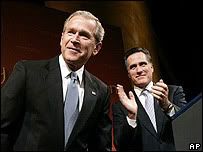
What Was It Like For Romney's Dog? Scientists weigh in on Mitt Romney's dog's experience of being on roof of car for 12-hour road trip. ABC News reports:
It may sound like a scene from Chevy Chase's "National Lampoon's Vacation." Mom and Dad pack their five boys into a white Chevy station wagon, load the luggage into the back, strap the dog to the top of the car and begin the annual family road trip from Boston to their summer home in Ontario.
Actually, it's not a movie. It's the true story of Mitt Romney's 1983 family vacation, according to an article in Wednesday's Boston Globe.
The article pegged Romney, the 2008 Republican presidential candidate and former governor of Massachusetts, as a family man, father to five sons, adoring husband and dog's not-so best friend. Using a 1983 family vacation to talk about Romney's family values, a shocking paragraph caught the eye of animal rights groups and angered pet owners across the country.
"Before beginning the drive, Mitt Romney put Seamus, the family's hulking Irish setter, in a dog carrier and attached it to the station wagon's roof rack. He'd built a windshield for the carrier, to make the ride more comfortable for the dog," read the article.
Jordan Kaplan, the owner of Petaholics, a dog walking service in New York City, and a lifelong dog owner and dog lover, said Romney's actions were uncalled for.
"It would be one thing if someone put it down or forgot and then drove 50 feet and realized what they did," said Kaplan. "I don't know anyone who would purposefully do that to a dog."
Physicist Dr. W.J. Llope, a senior faculty fellow at Rice University in the department of physics and astronomy, has his theory about the Romney's decision to strap Seamus to the top of the car.
"Seeing the inside of the car is full, Romney absentmindedly says to himself, 'Where am I going to put ole Seamus here?' and hearing his name, the dog says, 'Roof, roof,'" said Llope.
What Happens to a Dog on a Roof Traveling 50 MPH?
All kidding aside, what exactly would be the dangers of strapping the family pet to the roof of a speeding vehicle for 12 hours?
Llope said putting a dog on top of a car is just like putting anything or anyone else on the roof.
"What happens to a dog in this situation is precisely what would happen to any of us in the same situation: Trapped in a box for 12 hours would be no one's idea of comfortable," said Llope.
Dr. Russell Cumming, a professor of aerospace engineering at California Polytechnic State University, got a little more technical.
"At that speed, assuming sea level conditions, the poor little dog would have about 10 pounds per square foot pressing against his head," said Cumming.
And in layman's terms?
"He would constantly feel a little less than 3 pounds pressing on his head for the entire trip," he added. "The windshield would help, but boy that would get tired."
Nobel Prize-winning physicist Douglas Osheroff of physics at Stanford University said the dog crate on top of the car would change the air flow around the vehicle.
"Beyond a certain velocity, the air flow becomes turbulent," said Osheroff. "The airflow isn't going to be laminar," which means it won't have a uniform distribution.
Cumming said that's bad news for Seamus.
"Chances are the windshield would only protect the front of the dog, but the air flowing around the windshield would buffet the side of the dog -- that would be tiring," said Cummings. "My wife's a vet, and she would be more worried by the dehydration of the dog's eyes under those conditions."
In addition to dehydration, fatigue and fright, Seamus was strapped on top of a car for 12 hours with limited or no bathroom breaks -- a condition that was highlighted in the Boston Globe article.
"A brown liquid was dripping down the back window, payback from an Irish setter who'd been riding on the roof in the wind for hours," the article said.
After his son noticed the liquid, Romney pulled the car over and hosed down Seamus at a gas station before putting him back into the crate on top of the car and continuing on with the drive.
Just a Sign of the Times?
The incident happened more than 20 years ago, at a time when Pet Palaces and Doggie Day Cares didn't exist, so were the Romneys just following a trend? Maybe, said Kaplan, but that doesn't make it any more acceptable.
"Certainly, a lot has changed as to how we view our dogs, our pets since 1983. The dogs would stay in the basement with just a bowl of food, and now we have products and services for dogs that didn't exist 20 years ago," said Kaplan. "But I just couldn't imagine anyone would ever do that to a pet. What if they got hit? I would never do that to any animal."
But Osheroff said the inside of a car may not be any safer for the family pooch in the case of an accident.
"In general, if you have a dog in a car, that dog is not wearing a seat belt. And I dare say there were no seat belts for dogs [in 1983], so I don't know if it makes any difference where the dog is," said Osheroff.
He equated it to a dog riding in the back of a pick up truck, a sight commonly seen on America's roadways.
Political Implications: Pet Lovers Protest Romney
Will this nearly quarter-century-old tale affect Romney's presidential bid in 2008? That remains to be seen, but for now pet owners across the country are speaking out in defense of dearly departed Seamus.
Dog lovers certainly aren't happy. Thousands of readers have posted comments on The New York Times Web site attached to a blog discussing the anecdote.
"This can't be real, this has to be a joke, right? Who, in their right mind straps their dog to the roof of the car? I don't care if he's got a windshield on this dog carrier," read one comment.
"I'm also amazed the story didn't end with the death of the dog," read another. "Did he make any trips where he strapped his wife or one of his children up there?"
Others related Romney's actions to the type of president he would be.
"The people who will vote for him are those who think torturing animals, making them suffer is OK. He's a disgusting man, presidential candidate, NOT," wrote one poster.
Yet others seem to think Romney's seemingly lack of concern for Seamus' well-being was a quality that will help him win over voters.
"Mitt Romney will be a great president, he can think dispassionately, with a clear head and objectively," one poster said.
This story didn't come to light through dogged-research by investigative journalists. Romney volunteered it as an example of his cool-headed management skills, "'emotion-free crisis management': Father deals with minor — but gross — incident during a 1983 family vacation, and saves the day."
It's more like, "When Romney's policies create shitstorms, he hoses them down."
Romney's response to the controversy:
Per WTAE-TV in Pittsburgh: "Romney answered questions about a Boston Globe feature story that mentions how he strapped his dog's cage, with the animal inside, to the top of his family's car during a 12-hour road trip 24 years ago. He said Thursday that the pet enjoyed the experience, and he took a shot at People for the Ethical Treatment of Animals, a group that has labeled his actions as cruelty."
"You know, PETA has not been my fan over the years," Romney said. "PETA has been after me for having a rodeo at the Olympics and were very, very upset about that. PETA was after me when I went quail hunting in Georgia. And PETA is not happy that my dog likes fresh air."
After eight years of selfish, greedy sadists, Republicans want to saddle us with another clueless, insensitive ass. (Romney is the Bush family's choice in the 2008 elections.)

